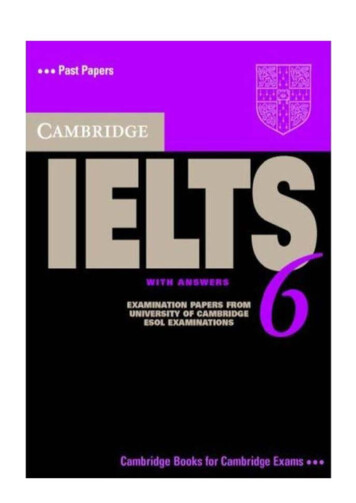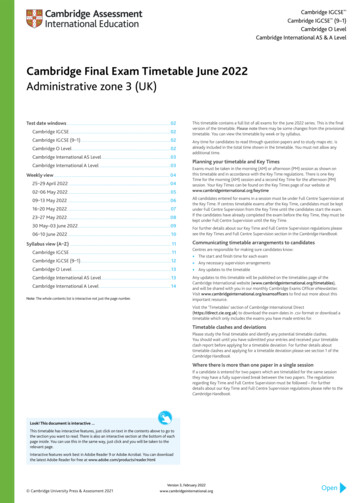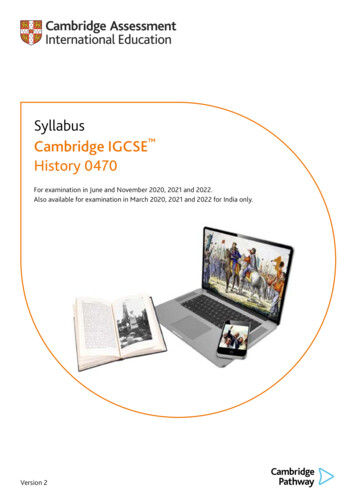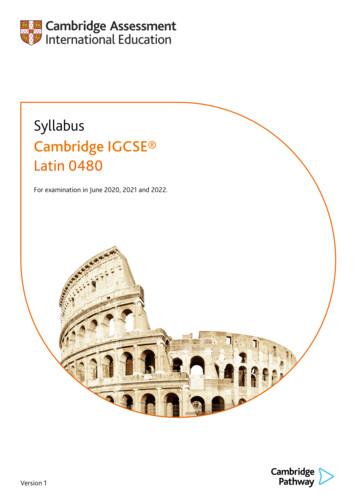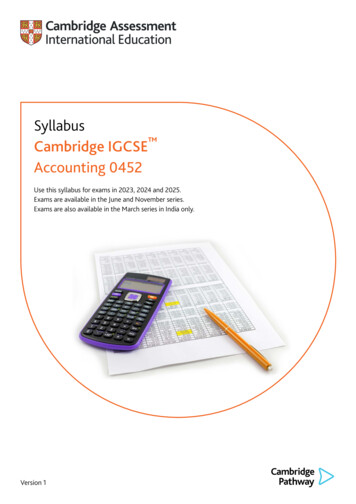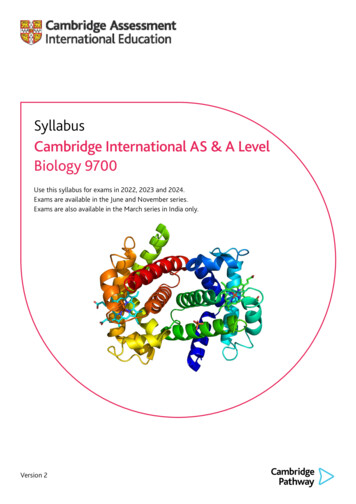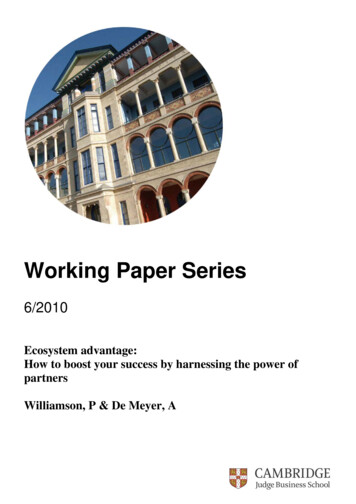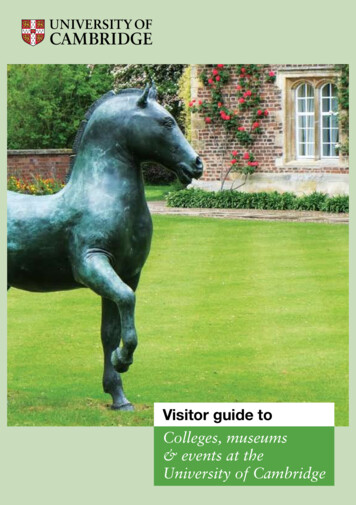
Transcription
SyllabusCambridge International AS & A LevelAccounting 9706Use this syllabus for exams in 2023, 2024 and 2025.Exams are available in the June and November series.Exams are also available in the March series in India only.Version 2
Why choose Cambridge International?Cambridge International prepares school students for life, helping them develop an informed curiosity and a lastingpassion for learning. We are part of the University of Cambridge.Our Cambridge Pathway gives students a clear path for educational success from age 5 to 19. Schools can shapethe curriculum around how they want students to learn – with a wide range of subjects and flexible ways to offerthem. It helps students discover new abilities and a wider world, and gives them the skills they need for life, so theycan achieve at school, university and work.Our programmes and qualifications set the global standard for international education. They are created by subjectexperts, rooted in academic rigour and reflect the latest educational research. They provide a strong platform forstudents to progress from one stage to the next, and are well supported by teaching and learning resources.We review all our syllabuses regularly, so they reflect the latest research evidence and professional teachingpractice – and take account of the different national contexts in which they are taught.We consult with teachers to help us design each syllabus around the needs of their learners. Consulting withleading universities has helped us make sure our syllabuses encourage students to master the key concepts in thesubject and develop the skills necessary for success in higher education.Our mission is to provide educational benefit through provision of international programmes and qualifications forschool education and to be the world leader in this field. Together with schools, we develop Cambridge learnerswho are confident, responsible, reflective, innovative and engaged – equipped for success in the modern world.Every year, nearly a million Cambridge students from 10 000 schools in 160 countries prepare for their future withthe Cambridge Pathway.‘We think the Cambridge curriculum is superb preparation for university.’Christoph Guttentag, Dean of Undergraduate Admissions, Duke University, USAQuality managementCambridge International is committed to providing exceptional quality. In line with this commitment, ourquality management system for the provision of international qualifications and education programmes forstudents aged 5 to 19 is independently certified as meeting the internationally recognised standard,ISO 9001:2015. Learn more at www.cambridgeinternational.org/ISO9001Copyright UCLES September 2020Cambridge Assessment International Education is part of the Cambridge Assessment Group. Cambridge Assessment is the brand name ofthe University of Cambridge Local Examinations Syndicate (UCLES), which itself is a department of the University of Cambridge.UCLES retains the copyright on all its publications. Registered centres are permitted to copy material from this booklet for their owninternal use. However, we cannot give permission to centres to photocopy any material that is acknowledged to a third party even forinternal use within a centre.
Contents1 Why choose this syllabus? .22 Syllabus overview . 6Aims6Content overview7Assessment overview8Assessment objectives93 Subject content . 10AS Level content10A Level content18Appendix – Summary of commonly used ratios (AS & A Level)264 Details of the assessment . 29Paper 1 – Multiple Choice29Paper 2 – Fundamentals of Accounting29Paper 3 – Financial Accounting30Paper 4 – Cost and Management Accounting30Command words315 What else you need to know . 32Before you start32Making entries33After the exam34How students, teachers and higher education can use the grades35Grade descriptions35Changes to this syllabus for 2023, 2024 and 202536Important: Changes to this syllabusFor information about changes to this syllabus for 2023, 2024 and 2025, go to page 36.
Cambridge International AS & A Level Accounting 9706 syllabus for 2023, 2024 and 2025.1 Why choose this syllabus?Key benefitsThe best motivation for a student is a real passion for the subjectthey’re learning. By offering students a variety of CambridgeInternational AS & A Levels, you can give them the greatest chanceof finding the path of education they most want to follow. Withover 50 subjects to choose from, students can select the onesthey love and that they’re best at, which helps motivate themthroughout their studies.Following a Cambridge International AS & A Level programmehelps students develop abilities which universities value highly,including: a deep understanding of their subjects higher order thinking skills – analysis, critical thinking,problem-solving presenting ordered and coherent arguments independent learning and research.Cambridge International AS & A Level Accounting engages students with the relevance and applicability ofaccounting in real-world contexts and encourages interest in the role and responsibilities of the accountant.Studying this subject helps students to understand, apply, analyse and evaluate accounting information to aiddecision-making in business and communicate information to stakeholders.These transferable skills are an ideal foundation for further study and for a future career within accounting orrelated professions.Our approach in Cambridge International AS & A Level Accounting encourages learners to be:confident, using accounting terminology and formats, preparing and analysing financial statements and learning tocommunicate accounting information to stakeholdersresponsible, considering how the ethical behaviour of accountants and auditors impacts the business and otherstakeholdersreflective, considering how the concepts and accounting standards underpin the preparation of accounts andimpact on the actions of the accountantinnovative, approaching learning and application with flexible and substantiated thinkingengaged, developing an interest in broader and evolving accounting issues, and exploring the range of types ofbusiness for which a robust accounting system is required.‘Cambridge students develop a deep understanding of subjects and independent thinking skills.’Principal, Rockledge High School, USA2www.cambridgeinternational.org/alevelBack to contents page
Cambridge International AS & A Level Accounting 9706 syllabus for 2023, 2024 and 2025. Why choose this syllabus?Key conceptsKey concepts are essential ideas that help students develop a deep understanding of their subject and make linksbetween different aspects. Key concepts may open up new ways of thinking about, understanding or interpretingthe important things to be learned.Good teaching and learning will incorporate and reinforce a subject’s key concepts to help students gain: a greater depth as well as breadth of subject knowledge confidence, especially in applying knowledge and skills in new situations the vocabulary to discuss their subject conceptually and show how different aspects link together a level of mastery of their subject to help them enter higher education.The key concepts identified below, carefully introduced and developed, will help to underpin the course you willteach. You may identify additional key concepts which will also enrich teaching and learning.The key concepts for Cambridge International AS & A Level Accounting are: A true and fair viewFinancial statements are designed to give a true and fair view of the financial position, performance andchanges in financial position of the business to internal and external stakeholders. DualityDuality in accounting recognises that every financial transaction has a double (or dual) effect on the position ofa business as recorded in the accounts. ConsistencyConsistency in the treatment of financial transactions enables the performance of a business to be comparedmeaningfully over different time periods. Business entityA business is a separate legal entity from the owner of a business. The accounting records must relate only tothe business and not to the personal assets and spending of the owner. Money measurementFinancial accounts only include items and transactions that can be expressed in terms of money. For example,the purchase of raw material is recorded in the accounts whereas staff creativity is not. Planning and controlManagement accounting provides a framework for a business to plan and control its finances and enablesinformed decision-making.Back to contents pagewww.cambridgeinternational.org/alevel3
Cambridge International AS & A Level Accounting 9706 syllabus for 2023, 2024 and 2025. Why choose this syllabus?International recognition and acceptanceOur expertise in curriculum, teaching and learning, and assessment is the basis for the recognition of ourprogrammes and qualifications around the world. Every year thousands of students with Cambridge InternationalAS & A Levels gain places at leading universities worldwide. Our programmes and qualifications are valued by topuniversities around the world including those in the UK, US (including Ivy League universities), Europe, Australia,Canada and New Zealand.UK NARIC, the national agency in the UK for the recognition and comparison of international qualifications andskills, has carried out an independent benchmarking study of Cambridge International AS & A Level and found it tobe comparable to the standard of AS & A Level in the UK. This means students can be confident that their CambridgeInternational AS & A Level qualifications are accepted as equivalent, grade for grade, to UK AS & A Levels by leadinguniversities worldwide.Cambridge International AS Level Accounting makes up the first half of the Cambridge International A Level coursein accounting and provides a foundation for the study of accounting at Cambridge International A Level. Dependingon local university entrance requirements, students may be able to use it to progress directly to university coursesin accounting or some other subjects. It is also suitable as part of a course of general education.Cambridge International A Level Accounting provides a foundation for the study of accounting or related courses inhigher education. Equally it is suitable as part of a course of general education.For more information about the relationship between the Cambridge International AS Level and CambridgeInternational A Level see the ‘Assessment overview’ section of the Syllabus overview.We recommend learners check the Cambridge recognition database and university websites to find the mostup-to-date entry requirements for courses they wish to study.Learn more at www.cambridgeinternational.org/recognitionThe depth of knowledge displayed by the best A Level students makes them prime targets forAmerica’s Ivy League universities.’Yale University, USA4www.cambridgeinternational.org/alevelBack to contents page
Cambridge International AS & A Level Accounting 9706 syllabus for 2023, 2024 and 2025. Why choose this syllabus?Supporting teachersWe provide a wide range of resources, detailed guidance and innovative training and professional development sothat you can give your students the best possible preparation for Cambridge International AS & A Level. To find outwhich resources are available for each syllabus go to our School Support Hub.The School Support Hub is our secure online site for Cambridge teachers where you can find the resources you needto deliver our programmes. You can also keep up to date with your subject and the global Cambridge communitythrough our online discussion forums.Find out more at www.cambridgeinternational.org/supportPlanning and preparationTeaching and assessment Next step guides Endorsed resources Schemes of work Online forums Specimen papers Support for coursework and speaking tests Syllabuses Teacher guidesLearning and revisionSupportfor CambridgeInternationalAS & A Level Example candidate responsesResults Candidate Results Service Learner guides Principal examiner reports for teachers Past papers and mark schemes Results Analysis Specimen paper answersSign up for email notifications about changes to syllabuses, including new and revised products and services ofessional developmentWe support teachers through: Introductory Training – face-to-face or online Extension Training – face-to-face or online Enrichment Professional Development – face-to-face or onlineFind out more at www.cambridgeinternational.org/events Cambridge Professional Development QualificationsFind out more at www.cambridgeinternational.org/profdevSupporting exams officersWe provide comprehensive support and guidance for all Cambridge exams officers. Find out more at:www.cambridgeinternational.org/eoguideBack to contents pagewww.cambridgeinternational.org/alevel5
Cambridge International AS & A Level Accounting 9706 syllabus for 2023, 2024 and 2025.2 Syllabus overviewAimsThe aims describe the purposes of a course based on this syllabus.The aims are to enable students to: understand the role of accounting as an information system for monitoring, problem-solving anddecision-making appreciate the ethical issues that underpin the practice of accounting and their impact on the behaviour of theaccountant and of businesses appreciate the place of accounting in managing business change in response to economic, social andtechnological developments develop the ability to apply and evaluate accounting concepts, principles, policies and practices develop skills of communication, analysis, interpretation and presentation of both qualitative and quantitativeaccounting information develop skills and knowledge needed for further study or employment in accounting or business.Cambridge Assessment International Education is an education organisation and politically neutral.The contents of this syllabus, examination papers and associated materials do not endorse any politicalview. We endeavour to treat all aspects of the exam process ck to contents page
Cambridge International AS & A Level Accounting 9706 syllabus for 2023, 2024 and 2025. Syllabus overviewContent overviewCambridge International AS Level students study topics 1.1–2.2.Cambridge International A Level students study all topics 1.1–4.4.AS Level topicsFinancialaccountingCost andmanagementaccountingA Level topics1.1 Types of business entity3.1 Preparation of financial statements1.2 The accounting system1.3 Accounting for non-current assets3.2 Regulatory and ethicalconsiderations1.4 Reconciliation and verification3.3 Business acquisition and merger1.5 Preparation of financial statements3.4 Computerised accounting systems1.6 Analysis and communication ofaccounting information3.5 Analysis and communication ofaccounting information2.1 Costs and cost behaviour4.1 Activity based costing (ABC)2.2 Traditional costing methods4.2 Standard costing4.3 Budgeting and budgetary control4.4 Investment appraisal‘Cambridge International AS & A Levels prepare students well for university because they’velearnt to go into a subject in considerable depth. There’s that ability to really understand thedepth and richness and the detail of a subject. It’s a wonderful preparation for what they aregoing to face at university.’US Higher Education Advisory CouncilBack to contents pagewww.cambridgeinternational.org/alevel7
Cambridge International AS & A Level Accounting 9706 syllabus for 2023, 2024 and 2025. Syllabus overviewAssessment overviewPaper 1Paper 3Multiple Choice1 hourFinancial Accounting1 hour 30 minutes30 marks75 marks30 multiple-choice questionsThree structured questionsQuestions are based on sections 1 and 2 of thesubject content.Externally assessedQuestions are based on section 3 of the subjectcontent; knowledge of material from the AS Levelsubject content is assumed.28% of the AS LevelExternally assessed14% of the A Level30% of the A LevelPaper 2Paper 4Fundamentals of Accounting1 hour 45 minutesCost and Management Accounting1 hour90 marks50 marksFour structured questionsTwo structured questionsQuestions are based on sections 1 and 2 of thesubject contentExternally assessedQuestions are based on section 4 of the subjectcontent; knowledge of material from the AS Levelsubject content is assumed.72% of the AS LevelExternally assessed36% of the A Level20% of the A LevelInformation on availability is in the Before you start section.There are three routes for Cambridge International AS & A Level Accounting:Route12AS Level only(Candidates take all AS componentsin the same exam series)A Level (staged over two years)Year 1 AS Level*Paper 1Paper 2 Year 2 Complete the A Level3A Level(Candidates take all components inthe same exam series) Paper 3Paper 4 * Candidates carry forward their AS Level result subject to the rules and time limits described in the Cambridge Handbook.Candidates following an AS Level route are eligible for grades a–e. Candidates following an A Level route are eligiblefor grades A*–E.8www.cambridgeinternational.org/alevelBack to contents page
Cambridge International AS & A Level Accounting 9706 syllabus for 2023, 2024 and 2025. Syllabus overviewAssessment objectivesThe assessment objectives (AOs) are:AO1 Knowledge and understanding Demonstrate knowledge and understanding of facts, terms, concepts, policies, procedures and techniquesrelating to financial accounting and cost and management accounting. Apply this knowledge and understanding to a variety of accounting situations and problems, and presentoutcomes in the most appropriate form.AO2 Analysis Analyse financial accounting information and cost and management accounting information. Select, calculate and interpret relevant data and information. Communicate outcomes in the most appropriate form.AO3 Evaluation Evaluate financial accounting information and cost and management accounting information to make informedrecommendations and decisions. Make judgements and draw conclusions based on financial and non-financial data.Weighting for assessment objectivesThe approximate weightings allocated to each of the assessment objectives (AOs) are summarised below.Assessment objectives as a percentage of each qualificationAssessment objectiveWeighting in AS Level %Weighting in A Level %AO1 Knowledge and understanding6355AO2 Analysis2530AO3 Evaluation1215Total100100Assessment objectives as a percentage of each componentAssessment objectiveWeighting in components %Paper 1Paper 2Paper 3Paper 4AO1 Knowledge and understanding70605444AO2 Analysis30233328–171328100100100100AO3 EvaluationTotalBack to contents pagewww.cambridgeinternational.org/alevel9
Cambridge International AS & A Level Accounting 9706 syllabus for 2023, 2024 and 2025.3 Subject contentThis syllabus gives you the flexibility to design a course that will interest, challenge and engage your learners.Where appropriate you are responsible for selecting subject contexts, resources and examples to support yourlearners’ study. These should be appropriate for the learners’ age, cultural background and learning context as wellas complying with your school policies and local legal requirements.Cambridge International AS Level candidates study topics 1.1–2.2.Cambridge International A Level candidates study all topics 1.1–4.4.The AS Level content is assumed knowledge for A Level Paper 3 and Paper 4.AS Level content1Financial accounting (AS Level)1.1Types of business entityCandidates will explore the various ways in which a business may be structured with reference to legal form,ownership, management and control. Candidates will investigate the benefits and drawbacks of each type ofentity from the point of view of owners and other stakeholders which will provide a context for the preparationof financial statements.1.1.1 Types of business entityCandidates should have an understanding of: the different types of business entity:–sole trader–partnership–limited company (including public limited company (plc)) the advantages and disadvantages of these types of business entity sources of finance and methods of funding for these types of business entity including:–loans (secured and unsecured)–bank overdrafts–payment by instalments–rental/leasing as an alternative to purchase–trade credit–sources of finance for limited companies as in 1.5.4Candidates are expected to use their understanding of types of business entity to take relevant decisions.Note: Questions on Limited Liability Partnerships will not be set.10www.cambridgeinternational.org/alevelBack to contents page
Cambridge International AS & A Level Accounting 9706 syllabus for 2023, 2024 and 2025. Subject content1.2 The accounting systemCandidates will examine the need for the systematic recording of business transactions and explore how thedouble entry system can be used to achieve this aim both in manual and computerised accounting systems.Additionally, candidates will consider the accounting theories and concepts which form the basis of financialaccounting.1.2.1 The accounting systemCandidates should have an understanding of: the principles of the double entry system to record business transactions the accounting equation the role of books of prime entry in the recording of business transactions–sales journal–sales returns journal–purchases journal–purchases returns journal–cash book–general journal preparation of ledger accounts the purpose of a trial balance the advantages and disadvantages of maintaining full accounting records the accounting concepts underpinning the preparation of accounts: business entity, historic cost, moneymeasurement, going concern, consistency, prudence, realisation, duality, materiality, objectivity, matching /accruals and substance over form the use of computerised accounting systems in recording financial transactions the advantages and disadvantages of introducing a computerised accounting system the ways in which the security of data can be ensured within a computerised accounting systemCandidates are expected to use their understanding of the accounting system to evaluate relevant informationand make informed business decisions.Note: Knowledge of specific applications or software is not required.Back to contents pagewww.cambridgeinternational.org/alevel11
Cambridge International AS & A Level Accounting 9706 syllabus for 2023, 2024 and 2025. Subject content1.3 Accounting for non-current assetsCandidates will look at the classification of business expenditure with particular reference to the treatment ofassets used in the longer term in a business. Candidates will also consider the purpose and methods of recordingthe cost of using those assets over time and the subsequent change in value.1.3.1 Capital and revenue income and expenditureCandidates should have an understanding of: the difference between the treatment of capital and revenue income and capital and revenue expenditure the effect on profit/loss and asset value of the incorrect treatment of capital and revenue expenditure1.3.2 Changing asset valuesCandidates should have an understanding of: factors that cause the value of non-current assets to depreciate the purpose of accounting for depreciation of non-current assets and the associated application of relevantaccounting concepts how to calculate depreciation using the reducing balance and straight-line methods the most appropriate method of calculating depreciation how to measure the value of non-current assets by the cost model or the revaluation model how to prepare ledger accounts and journal entries for:–non-current assets (acquisition and revaluation)–depreciation and disposal (including entries for part exchange) how to calculate profit or loss on disposal of a non-current asset how to record the effect of a charge for depreciation in the statement of profit or loss and statement offinancial position1.4 Reconciliation and verificationCandidates will assess the importance of being able to prepare complete and accurate financial statementsfrom underlying business records. In doing so candidates will consider the various methods available to identifyand rectify errors and omissions using internal procedures and third-party documentation, as well as exploringpossible limitations of such measures.1.4.1 Reconciliation and verificationCandidates should have an understanding of:12 the need to reconcile and verify ledger accounts using documentation from internal and external sources the benefits and limitations of reconciliation and verification k to contents page
Cambridge International AS & A Level Accounting 9706 syllabus for 2023, 2024 and 2025. Subject content1.4 Reconciliation and verification continued1.4.2 Trial balanceCandidates should have an understanding of: errors which affect the trial balance errors which do not affect the trial ginal entry–reversal–compensating how to prepare ledger accounts and journal entries to correct errors using a suspense account the effect on the financial statements of the correction of errors the benefits and limitations of a trial balance1.4.3 Bank reconciliation statementsCandidates should have an understanding of: updating of cash books how to prepare bank reconciliation statements the benefits and limitations of preparing a bank reconciliation statement1.4.4 Control accountsCandidates should have an understanding of: entries in control accounts sales ledger control accounts and purchases ledger control accounts reconciliation statements between control account balances and ledger balances the effects on financial statements of the correction of errors the benefits and limitations of control accountsCandidates are expected to use their understanding of reconciliation and verification to evaluate relevantinformation and make informed business decisions.Back to contents pagewww.cambridgeinternational.org/alevel13
Cambridge International AS & A Level Accounting 9706 syllabus for 2023, 2024 and 2025. Subject content1.5 Preparation of financial statementsCandidates will consider how figures in a trial balance need to be adjusted in order to prepare a complete setof financial statements in accordance with the matching/accruals concept and other fundamental accountingconcepts. In particular, candidates will examine the differing formats of financial statements necessary forsole traders, partnerships and limited companies. Candidates will address specific aspects relating to howpartnerships account for individual partners’ shares of profits and losses, and study the characteristics of limitedcompany financial statements, particularly share capital and reserves. This gives an opportunity to build on thebackground information relating to types of business entity introduced in 1.1.Note: For the expected formats for the standard financial statements, see the document Teacher Guidance for9706 Accounting which accompanies this syllabus.1.5.1 Adjustments to draft financial statementsCandidates should have an understanding of: how to calculate and record the adjustments needed and the effect on financial statements in respect of:–accruals and prepayments of income and expenses–irrecoverable debts, irrecoverable debts recovered and allowance for irrecoverable debts–depreciation–inventory valuation–correction of errors1.5.2 Sole tradersCandidates should have an understanding of: how to prepare a statement of profit or loss and statement of financial position for a sole trader from full orincomplete accounting records. The business may be a trading or a service business1.5.3 PartnershipsCandidates should have an understanding of:14 how to prepare a statement of profit or loss, appropriation account and statement of financial position for apartnership from full or incomplete accounting records. The business may be a trading or a service business why partners may maintain separate capital accounts and current accounts how to prepare partners’ capital and current accounts the contents of a partnership agreement the advantages and disadvantages to partners of maintaining a partnership agreement the provisions of the Partnership Act 1890 in respect of partners’ salaries, division of profit or loss, intereston partners’ loans, interest on capital and interest on drawingswww.cambridgeinternational.org/alevelBack to contents page
Cambridge International AS & A Level Accounting 9706 syllabus for 2023, 2024 and 2025. Subject content1.5 Preparation of financial statements continued1.5.4 Limited companiesCandidates should have an understanding of: the features and accounting treatment of ordinary shares, bonus issues, rights issues, debentures, dividendsand reservesNote: Questions will not be set on preference shares. the advantages and disadvantages to the company and to the shareholders of a company making a bonusissue of shares and a rights issue of shares the advantages and disadvantages to the company and to the shareholders of a company issuing shares andissuing debentures the distinction between capital reserves (share premium and revaluation reserve) and revenue reserves(retained earnings and general reserve) how to prepare ledger accounts to record:–an issue of ordinary shares at par or at a premium–a rights issue of shares at par or a
Accounting 9706 Use this syllabus for exams in 2023, 2024 and 2025. . Cambridge Assessment International Education is part of the Cambridge Assessment Group. Cambridge Assessment is the brand name of . These transferable skills are an ideal foundation for further study and for a future career within accounting or
